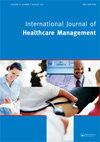Impact of virtual reality on performance among undergraduate healthcare professionals: A cross-sectional study
IF 1.1
Q4 HEALTH POLICY & SERVICES
International Journal of Healthcare Management
Pub Date : 2023-11-10
DOI:10.1080/20479700.2023.2281066
引用次数: 0
Abstract
ABSTRACTIn recent years, Virtual Reality (VR) has been increasingly used to train healthcare professionals. However, certain aspects of its application, such as the relationship between VR environments, training, and Sense of Presence (SoP), have yet to be explored. SoP impacts learners’ performances in certain learning situations, whereas in others, it does not. This study aimed to investigate the impact of VR, including SoP, on immersive mass incident simulation performances. A cross-sectional study was performed by immersing 83 undergraduate students (ambulance attendants, student nurses, and medical students) in a VR simulation. Questionnaires were administered before, during, and after the simulation to assess variables impacting non-technical skills. The results revealed that SoP was not associated with performance (P = 0.66). However, performance was associated with the learners’ perceptions of the VR environment (P = 0.008). Therefore, the impact of environmental perception on performance should be considered, allowing instructors to promote optimal training in VR. Moreover, SoP may impact performance in certain types of learning, like emotional skills training. Thus, VR should be chosen as a simulation modality to encourage reflexivity through rapid feedback and learning skills in the affective domain.KEYWORDS: Numerical simulationaptitudedisaster medicineteachingeducation Disclosure statementNo potential conflict of interest was reported by the author(s).Additional informationFundingThe author(s) report that no funding was associated with the work featured in this article.Notes on contributorsSabrina ChevalierSabrina Chevalier, MSc, RN: Mrs Chevalier works as nurse in intensive care unit. She is a nurse with a specialization in intensive care and urgent medical assistance and a master’s degree in public health. She is also certified to work as a simulation instructor. She is an assistant at the University of Liege in the master’s in science of nursing. Mrs Chevalier has started a PhD on simulation in the master’s in science of nursing.Méryl PaquayMéryl Paquay, MSc, RNCC, RN: Mrs Paquay works as a quality and safety care manager. She is a nurse with a specialization in community health and a master’s degree in public health. She is also certified to work as a simulation instructor. Mrs Paquay is finalizing her PhD on patient safety and clinical debriefings. Her area of expertize covers topics related to hospital management, patient safety and the impact of the work environment on the quality of care.Jonathan GoffoyJonathan Goffoy, MSc, RN: Mr Goffoy works as nurse perfusionist in the operating room. He is a nurse with a specialization in intensive care and urgent medical assistance and a master’s degree in public health. He is also certified to work as a simulation instructor. He is working on various research projects in the Simulation Center of Liège.Jean-Christophe ServotteJean-Christophe Servotte, PhD, MSc, RN: Dr Servotte is a teacher-researcher in the paramedical department of Henallux. He is a nurse with a specialization in intensive care and urgent medical assistance and a master’s degree in public health. His doctoral thesis is entitled ‘Contribution to the understanding of the impact of different simulation modalities on health learning’. Today he is a simulation trainer and research project manager.Samuel StipulanteSamuel Stipulante, PhD, MSc, RN: He is a nurse with a specialization in intensive care and urgent medical assistance and a master’s degree in public health. His doctoral thesis is in the field of cardiorespiratory arrest. Since 2007, he has been in charge of the Centre de Secours 112 in Liège. He is a professor in the Master in science in nursing at the University of Liege. He is the promoter of several doctoral theses, notably in the field of advanced practice nurses.Alexandre GhuysenAlexandre Ghuysen, MD, PhD qualified as medical doctor from the Liège University in 1992, trained in internal medicine in 1997 and emergency medicine in 1999, and PhD in Biomedical and experimental science in 2006. He has been the promoter of several PhD thesis, notably in the field of emergency and acute care medicine. At present, he is both professor at Liège University where he teaches acute care medicine, Head of the Center for Medical Simulation at the same University and Head of the Emergency Department at CHU Liège.虚拟现实对本科医疗专业人员绩效的影响:一项横断面研究
近年来,虚拟现实(VR)越来越多地用于培训医疗保健专业人员。然而,其应用的某些方面,如虚拟现实环境、训练和存在感(SoP)之间的关系,还有待探索。SoP在某些学习情境中会影响学习者的表现,而在其他情境中则不会。本研究旨在探讨包括SoP在内的VR对沉浸式大规模事件模拟性能的影响。横断面研究通过将83名本科生(救护车服务员、实习护士和医学生)沉浸在VR模拟中进行。在模拟之前、期间和之后进行问卷调查,以评估影响非技术技能的变量。结果显示,SoP与工作表现无显著相关性(P = 0.66)。然而,表现与学习者对VR环境的感知相关(P = 0.008)。因此,应该考虑环境感知对表现的影响,使教师能够在VR中促进最佳训练。此外,SoP可能会影响某些类型的学习表现,如情感技能培训。因此,应该选择VR作为一种模拟方式,通过快速反馈和情感领域的学习技能来鼓励反身性。关键词:数值模拟;能力;灾害医学;;其他信息资金来源作者报告,没有资金与本文所述的工作相关。萨布丽娜·谢瓦利埃萨布丽娜·谢瓦利埃,理学硕士,注册护士:谢瓦利埃夫人在重症监护室工作。她是一名护士,专攻重症监护和紧急医疗援助,拥有公共卫生硕士学位。她还获得了模拟讲师的认证。她是列日大学护理学硕士助理。Chevalier女士已经开始攻读模拟博士学位和护理学硕士学位。ms . Paquay, MSc, RNCC,注册护士:ms . Paquay是一名质量和安全护理经理。她是一名护士,拥有社区卫生专业和公共卫生硕士学位。她还获得了模拟讲师的认证。帕奎夫人正在完成她关于病人安全和临床报告的博士学位。她的专业领域涉及医院管理、患者安全和工作环境对护理质量的影响。乔纳森·戈夫伊,理学硕士,注册护士:戈夫伊先生是手术室的护士灌注师。他是一名护士,专攻重症监护和紧急医疗援助,拥有公共卫生硕士学位。他还获得了模拟讲师的认证。他在生命模拟中心从事各种研究项目。Jean-Christophe Servotte,博士,理学硕士,注册护士:Servotte博士是Henallux医院辅助医疗部门的教师兼研究员。他是一名护士,专攻重症监护和紧急医疗援助,拥有公共卫生硕士学位。他的博士论文题为“对理解不同模拟模式对健康学习的影响的贡献”。如今,他是一名模拟培训师和研究项目经理。Samuel托兰特,博士,理学硕士,注册护士:他是一名护士,专攻重症监护和紧急医疗援助,拥有公共卫生硕士学位。他的博士论文是关于心肺骤停的。自2007年以来,他一直负责里昂热的112安全中心。他是列日大学护理学硕士教授。他是几篇博士论文的发起人,特别是在高级实践护士领域。Alexandre Ghuysen,医学博士,1992年获得里昂热大学医学博士资格,1997年获得内科培训,1999年获得急诊医学培训,2006年获得生物医学和实验科学博士学位。他是几篇博士论文的发起人,特别是在急诊和急性护理医学领域。目前,他是li大学急症医学教授,该大学医学模拟中心主任和CHU li大学急诊科主任。
本文章由计算机程序翻译,如有差异,请以英文原文为准。
求助全文
约1分钟内获得全文
求助全文
来源期刊

International Journal of Healthcare Management
HEALTH POLICY & SERVICES-
CiteScore
5.40
自引率
9.50%
发文量
77
 求助内容:
求助内容: 应助结果提醒方式:
应助结果提醒方式:


